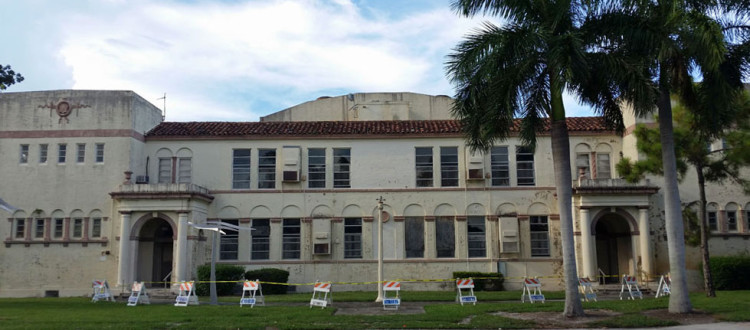Boynton Beach Real Estate Attorney Will Protect Your Historic Property
Preserving Boynton Beach History Comes at a Price
For more than several years now the residents of Boynton Beach and the City Commission have debated back and forth about what to do with the Old Boynton Beach High School, built in 1927 on Ocean Avenue. The building blends Mediterranean Revival and early Art Deco styles; architectural details include arched arcades of windows, entrance urns, and columns of the Doric, Ionic and Corinthian orders. The graceful elements of this historic building, although crumbling in parts and faded by time and disuse, are still quite visible and lovely. The school has sat empty now for more than 20 years, but much like an aging beauty queen, it is hard not to see the good bone structure underneath the wrinkles and dust.
The school was once a bustling city landmark – the host to numerous community activities and events. Notwithstanding the sagging façade, the Old High School still calls out to many residents and asks to be restored to the shining gem it once was – but that comes with a big price tag. Money is always at the heart of these debates. It is an age old question – how much money will it take to preserve history?
According to the Palm Beach Post, since 1993 Boynton Beach has paid about $350,000 to conduct more than a dozen adapted reuse studies on what to do with the school. It was further reported that some City documents say restoring the historic building would cost at least $1 million, whereas demolishing it would cost about $275,000.
If you own a historic property in Palm Beach County and have questions about the local ordinances that may limit your ability to renovate the structure, call an experienced Boynton Beach real estate attorney at Boynton Law, P.A.
In 2005, the Old High School was turned over to the Boynton Beach Community Redevelopment Center. The idea at that time was to refurbished the school and turn it into an office and artist building to serve as the focal point of old downtown. The hope was to ignite a much needed revitalization to the downtown area, but the project, which also featured the addition of a surrounding garden and cafe, never received the required funding.
In 2012, a Lake Worth architect submitted a $4.5 million proposal to redevelop the 30,000 square-foot school into a financially self-sustaining muti-use entertainment venue. The renovation project included shops, restaurants, a cultural arts center, and a green market. The plan was initially approved by the City, but ultimately failed when the developer’s subsequent paperwork was deemed “deficient,” as reported by the Palm Beach Post in 2013.
Last month a majority of the City Commissioners voted to raze the building, but after a public outcry over the decision, the Mayor and Commissioners agreed at a subsequent meeting to delay the demolition for 4 months. During the delay, the City leaders will consider yet another design and restoration proposal, this time prepared by REG Architects, Inc., a West Palm Beach architectural firm that specializes in historic preservation and community planning.
There are numerous federal and state laws that recognize the importance of preserving historic resources, but given the local nature of all land use issues, it is really local government that regulates and gives life to historic preservation laws. Historic preservation ordinances typically provide for the protection of both historic districts and isolated structures deemed historically significant. Almost all of the local ordinances will create a historic preservation commission or design review board, comprised of members appointed because of their interest in or expertise in architecture or historic preservation. These administrative bodies are charged with enforcing the criteria for the designation of historic properties. The criteria is usually adopted from the factors set out in the federal and state preservation laws, to help ensure eligibility for federal and state grants available to finance historic restoration projects. The preservation commission is also the administrative body that will review a landowner’s application for a variance from the regulations or a request to alter, move, or demolish a historic property. Most, if not all historic preservation ordinances, establish a permitting process that allows for alteration, modification or renovation of a property listed on the historic registry.
There are more than 2300 historic preservation ordinances enacted across the United States. Palm Beach County has such an ordinance, as does the City of Boynton Beach. More specifically, the City’s website states Boynton Beach “recognizes the importance of preserving its historic resources and has adopted a preservation ordinance as the foundation for a comprehensive preservation program.” Program oversight in the City is the responsibility of the Historic Resources Preservation Board.
On occasion a landowner will intentionally neglect a historically “protected” structure in the hope of obtaining a permit for demolition when the structure finally reaches a state where it jeopardizes public safety. In order to prevent the deterioration that endangers the historic aspects of the building, Florida courts have consistently upheld “reasonable requirements” in historic preservation ordinances that require landowners to maintain their property, so that this “demolition by neglect” does not occur.
In most instances, a local historic designation will increase the value of the property. Property taxes for buildings within historic districts are taxed no differently than those outside the district, but many times the owners of historic buildings enjoy certain tax breaks. The Florida Constitution was amended in 1992 to allow counties or municipalities to enact local ordinances that give ad valorem tax exemptions to owners of historic properties. Section 196.1997, Florida statutes, is the primary law governing these specific tax exemptions. In 1995, Palm Beach County adopted an ordinance that provides for tax exemptions under state law. The City of Boynton Beach, as referenced on its website, plans to sign an inter-local agreement with the County to allow for these tax breaks as a part of its own historic preservation ordinance.
There are many laws and local regulations that must be reviewed before any work may be done on a designated historic property – whether the renovation involves replacing a historic window or door to plans for a new addition – the work must be permitted and approved before hand. Call the experienced Boynton Beach real estate lawyers at Boynton Law, P.A. for a free consultation.

